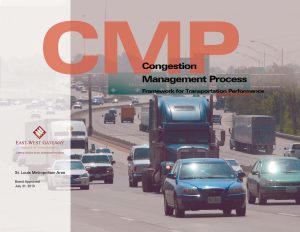 In 2013 East-West Gateway Council of Governments (EWG) issued the Congestion Management Process (CMP) Final Report, which details the CMP for the St. Louis region. As the metropolitan planning organization (MPO) for the St. Louis region, EWG is required to develop and implement the CMP as an integral part of the metropolitan planning process.
In 2013 East-West Gateway Council of Governments (EWG) issued the Congestion Management Process (CMP) Final Report, which details the CMP for the St. Louis region. As the metropolitan planning organization (MPO) for the St. Louis region, EWG is required to develop and implement the CMP as an integral part of the metropolitan planning process.
About the CMP
The CMP is a systematic and regionally-accepted approach for managing congestion that provides accurate, up-to-date information on transportation system performance and assesses alternative operational and demand management strategies for congestion mitigation. A CMP is required in metropolitan areas with population exceeding 200,000, such as the St. Louis region. First established under the national transportation act, the Intermodal Surface Transportation Efficiency ACT (ISTEA), the requirement has evolved through subsequent acts, the Safe, Accountable, Flexible, Efficient Transportation Equity Act: A Legacy for Users (SAFETEA-LU), the Moving Ahead for Progress in the 21st Century Act (MAP-21), and the recently passed, Fixing America’s Surface Transportation (FAST) Act which calls for regionally established mobility performance goals.
The federal initiative provides the planning framework for a CMP that represents the state-of-the-practice in identifying congestion and addressing congestion impacts through systematic operational management and demand oriented strategies. The CMP also enables MPOs to bring a data driven, objective basis to the process of identifying and implementing congestion management strategies that will allow the region to target the principal causes of congestion at the most congested and safety impacted areas and achieve the greatest benefit to the region.
Congestion Management and Operations Committee (CMOC)
The CMOC provides an opportunity for sharing information about the operation of the regional transportation system between stakeholders, and is a forum for supporting and promoting coordination and integration of the multi-modal regional transportation system.
The CMOC was initially established with the development and implementation of the CMP and acted in an advisory role in providing vital input and direction to the CMP planning process, outcomes, and implementation. The CMOC is comprised of vested stakeholders from federal, state, transit, and the St. Louis region’s counties and principal municipalities.
The CMOC meets on a bi-monthly basis addressing issues of regional congestion and operations management and assigns an ad hoc Technical Committee for addressing detailed mobility and operations issues as needed. In practice, the CMOC represents a collective framework for ongoing cross-jurisdictional coordination of traffic performance reporting, while advancing data collection activities in the process of establishing performance measures for the St. Louis region’s transportation network.
The CMOC also serves as the St. Louis Regional Intelligent Transportation System (ITS) Architecture Maintenance Team. The team’s role is to identify changes in the St. Louis region related to the ITS Architecture and make decisions by consensus on how the changes should be reflected in the Architecture.
Annual Regional Congestion Report
The CMP requires monitoring of the transportation system and evaluation of congestion. EWG produces an Annual Regional Congestion Report that identifies congested locations on the region’s transportation system. The report evaluates congestion levels and provides an area wide picture of how travel on various roadways is affected by congestion.
2021 Annual Regional Congestion Report
2020 Annual Regional Congestion Report
2019 Annual Regional Congestion Report
2018 Annual Regional Congestion Report
2017 Annual Regional Congestion Report
2016 Annual Regional Congestion Report
2015 Annual Regional Congestion Report
2013 Congestion Management Process Report
Congestion Dashboard
The congestion dashboard is a visualization tool created in ArcGIS Online. It provides a spatial representation of the congested segments of the transportation network within the St. Louis region, for the most recent year of analysis. The tool contains information on the length of congested roads, the severity of congestion, and the planning and travel time indices. The congestion dashboard complements the Congestion Report and is accessible via the following links.

